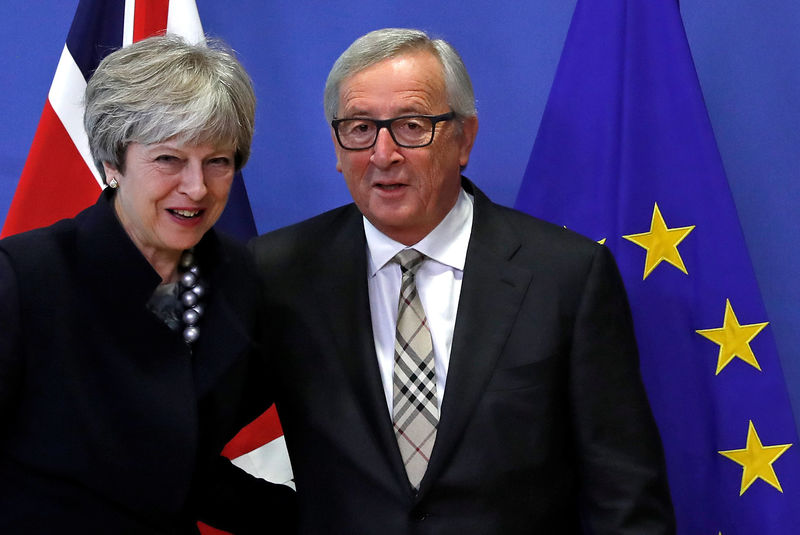 © Reuters. Britain’s PM May is welcomed by EU Commission President Juncker at the European Commission in Brussels
© Reuters. Britain’s PM May is welcomed by EU Commission President Juncker at the European Commission in BrusselsBy Gabriela Baczynska and Elizabeth Piper
BRUSSELS (Reuters) – Prime Minister Theresa May failed to clinch a deal on Monday to open talks on post-Brexit free trade with the European Union after a tentative deal with Dublin to keep EU rules in Northern Ireland angered her allies in Belfast.
The British leader had sat down to lunch with European Commission President Jean-Claude Juncker hoping that a last-minute offer to the Irish government of “regulatory alignment” on both sides of a new UK-EU land border would remove a last obstacle to the EU open talks next week on future trade.
Yet as May and Juncker spoke in Brussels and the pound rose on prospects of free trade and perhaps a very “soft Brexit”, Northern Ireland’s Democratic Unionist Party (DUP) issued an uncompromising reiteration of its refusal to accept any “divergence” from rules on the British mainland.
Irish Prime Minister Leo Varadkar canceled a news conference and the pound fell back, losing a cent against the dollar, as May and Juncker emerged to say there was still not “sufficient progress” on divorce terms to move ahead.
May agreed with Juncker that a deal could be reached in a few days before the EU summit on Dec. 14-15, but that promise did little to stem recriminations at home, where Brexit campaigners want Britain to become what one called a “free agent” and set its own rules.
Varadkar shared the view of some officials in Brussels that it was an opportunity missed.
“I’m surprised and disappointed that the U.K. government appears not to be in a position to conclude what was agreed earlier today,” he told a news conference in Dublin.
“I accept that the British prime minister has asked for more time and I know that she faces many challenges and I acknowledge that she is negotiating in good faith but my position and that of the Irish government is unequivocal.”
HARD BORDER
The Irish border has emerged as a defining issue for Brexit, one of the thorniest of three main issues, which include how much Britain should pay to leave and protections for expatriate citizens rights, to be settled before moving talks forward.
With time running down after Britain triggered the two-year divorce process in March, May is keen to push the talks to a discussion of future trade to try to offer nervous businesses some certainty over their investment decisions.
All sides say they want to avoid a return to a hard border between EU member Ireland and the British province of Northern Ireland, which might upset the peace established after decades of violence.
But they have found it difficult to find the right wording on guaranteeing the unguarded border as set out in the 1998 Good Friday peace agreement that will suit all sides.
Dependent on the support of lawmakers in the DUP for a majority in parliament, May must keep them on board and has repeated that she wants to maintain the economic integrity of the United Kingdom in any Brexit deal.
By suggesting May would settle for continued regulatory alignment if there was no alternative way, some in the DUP and in her own party fear Northern Ireland could get a kind of special status that could draw it away from the mainland.
A DUP source said the party’s leader, Arlene Foster, had spoken to May while she was in Brussels. The phone call took place shortly after Foster told supporters she would not allow a Brexit deal that created “regulatory divergence”.
The leaders of Scotland and Wales, and the mayor of London, also announced that they would want to follow suit if special terms were agreed for Northern Ireland.
“We haven’t decided to dismantle the United Kingdom and give in to the demands of the Irish government,” said pro-Brexit lawmaker Jacob Rees-Mogg after a Conservative Party meeting in London.
May’s aides were sanguine, saying expectations had been too high for what some had billed as a crunch meeting in Brussels, and they played down any involvement of the DUP in sinking the deal.
One EU official even said the last-minute hitch may have been stage-managed to give the British prime minister some scope for saying she had fought hard for her position with the EU.
Juncker hailed May as a “tough negotiator”.
May added: “We will reconvene before the end of the week and I am also confident that we will conclude this positively.”
But European Council President Donald Tusk, who met May and who will chair next week’s summit in Brussels, said that he had been ready to send draft negotiating guidelines for a free trade pact to EU leaders on Tuesday.
“It is now getting very tight but agreement at December (summit) is still possible,” Tusk tweeted.
Source: Investing.com




























